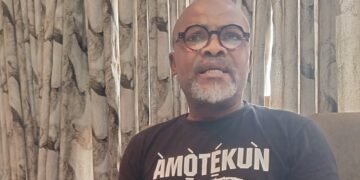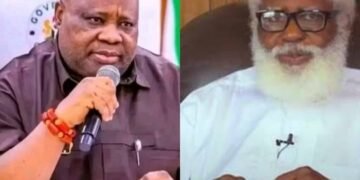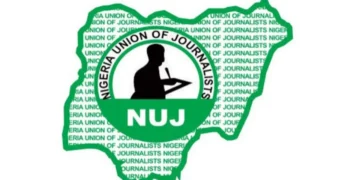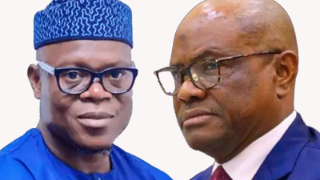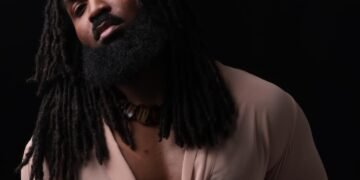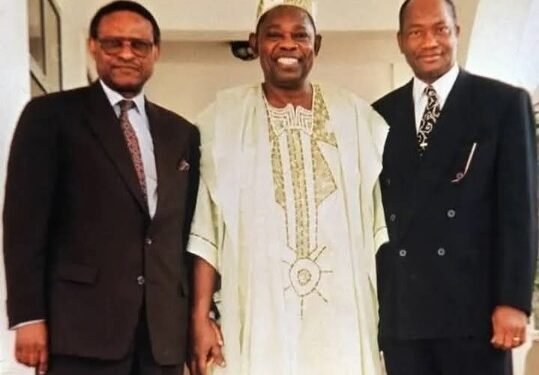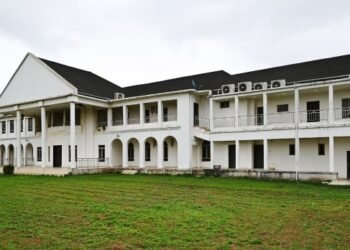The historic July 1998 photograph that captured the last public appearance of Chief MKO Abiola, Nigeria’s democracy icon, alongside Emeka Anyaoku and Rear Admiral Mike Akhigbe.
A Defining Moment in Nigeria’s Political History
The photograph, taken on July 1, 1998, in Lagos, Nigeria, captured a poignant moment in the nation’s democratic struggle. At the centre stood Chief Moshood Kashimawo Olawale Abiola (MKO Abiola), the now-acknowledged winner of the June 12, 1993 presidential election—an election widely regarded as the freest and fairest in Nigeria’s history.
Flanking him in the photograph in what turned out to be his last public appearance, were Chief Emeka Anyaoku, then, the Secretary-General of the Commonwealth and the late Rear Admiral Mike Akhigbe, who served as Chief of General Staff during the transitional government that followed the death of military ruler General Sani Abacha.
The image, believed to be the last known photograph of Chief Abiola alive, carried profound historical weight. It symbolised both the unfulfilled hopes of a nation and the courage of a man who became the face of Nigeria’s struggle for democracy.
Background: The 1993 Presidential Election and Its Annulment
Chief MKO Abiola, a wealthy businessman, philanthropist, and politician, contested the 1993 presidential election on the platform of the Social Democratic Party (SDP). His opponent, Bashir Tofa of the National Republican Convention (NRC), was widely defeated, according to unofficial results.
However, the then-military government, led by General Ibrahim Babangida, annulled the election before the final results were officially declared. The annulment sparked national outrage, protests, and international condemnation, as it was seen as a betrayal of Nigeria’s democratic aspirations.
In 1994, defying the regime’s restrictions, Abiola publicly declared himself the rightful president of Nigeria, an act that led to his arrest and imprisonment by the late General Sani Abacha, who had seized power in a subsequent coup.
Imprisonment and Global Outcry
During his four years in detention, MKO Abiola became a global symbol of democratic resistance. Despite intense pressure from world leaders and human rights organisations—including the United Nations, Commonwealth of Nations, and Amnesty International—the Nigerian military government refused to release him.
His incarceration was marked by deteriorating health, isolation, and uncertainty. Yet, Abiola’s steadfastness earned him international recognition as a hero of democracy. The Commonwealth Secretary-General, Emeka Anyaoku, and other diplomats made numerous attempts to negotiate his release.
The Meeting That Preceded His Death
The last photograph taken on July 1, 1998, representing his last public appearance, came just six days before the death of Chief MKO Abiola. Following the sudden demise of General Abacha on June 8, 1998, General Abdulsalami Abubakar assumed leadership and initiated a process of political transition.
As part of the reconciliation efforts, Abiola met with the then Commonwealth Secretary-General, Emeka Anyaoku and other officials, including Rear Admiral Mike Akhigbe, in what was reportedly a step toward his release. Observers described the meeting as cordial and cautiously optimistic, with hopes that Abiola would soon regain his freedom and play a role in Nigeria’s return to civilian rule.
Tragically, on July 7, 1998, barely a week after the meeting (where the photograph was taken), Chief Abiola died suddenly in custody. Official reports claimed he suffered a heart attack during a meeting with visiting US officials. His death, occurring barely a month after the demise of Abacha, plunged the nation into grief, suspicion, and anger.
Legacy of a Democratic Martyr
Chief MKO Abiola’s death marked the end of one of Nigeria’s most turbulent political chapters. Yet, his ideals and sacrifices became the foundation for the country’s eventual return to democracy in 1999.
In recognition of his enduring impact, the Nigerian government in 2018 officially declared June 12 as Democracy Day, replacing the previous May 29 celebration. Abiola was posthumously honoured with the title Grand Commander of the Federal Republic (GCFR)—the nation’s highest honour—once reserved for presidents, and with the late Chief Obafemi Awolowo as the first recipient of the honour, without being a president.
Today, his name resonates not only as a political figure, but also as a symbol of hope, resilience, and national unity. The photograph taken on that July day in 1998 remains an indelible reminder of both the price of freedom and the enduring spirit of Nigeria’s democratic struggle.
The final photograph of Chief MKO Abiola alongside Emeka Anyaoku and Mike Akhigbe represents more than a political encounter—it captures a historic turning point in Nigeria’s journey toward democracy. It is a moment frozen in time, reflecting the courage of a man who stood unyielding in the face of oppression and the beginning of the dawn that followed years of darkness.
•Culled from Historical Nigeria- Yoruba (Facebook, 16/10/2025).


